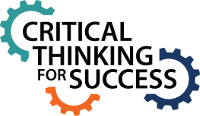Teach Your Kids Critical Thinking Skills with the 3 M’s of Parenting
 Everyone knows that good parenting is important and difficult work. In many ways it’s like having a job. The problem is that parents receive no training of any kind on how to raise children. So what are the consequences?
Everyone knows that good parenting is important and difficult work. In many ways it’s like having a job. The problem is that parents receive no training of any kind on how to raise children. So what are the consequences?
A recent poll from the Pew Research Center reveals that 32.1% of people aged 18-34 are living with their parents. That’s more than in any other type of living arrangement. This is the first time that’s been the case in the modern era. For the first time since the polls started tracking this, young people are continuing to live with their parents into adulthood.
How did this happen? What changed in parenting that led to this newfound lack of independence?
Let’s take a look at how parenting has changed, and what you can do to ensure your children have the skills they need to lead independent, fulfilling lives.
How Has Parenting Changed?
To truly succeed in life, every child has to develop certain cognitive skills. These skills help them solve both simple and complex problems—they’re the basic tools you use to tackle anything that comes your way.
In the pre-war era, kids would learn these critical thinking skills and train them from an early age. This is because back then, children used to see their parents work. They were considered assets, trained to fulfill roles that help out the family while also providing valuable life experience.
 This way, learning those vital critical thinking skills was woven right into the fabric of society.
This way, learning those vital critical thinking skills was woven right into the fabric of society.
In the postwar era, that dynamic has disappeared. Children are now kept shuttered up at home or in school all day. You never see children out and about in society, learning to navigate the world. They often have little to no idea of what their parents do when they’re away at work. Their time is often micromanaged, but they aren’t given practical roles or jobs in the home to help them learn skills.
As a result, they have to make up for that deficiency by learning those skills later in life.
A good analogy for this is exercise. Long ago, people would get all the exercise they need from their daily activities. In ancient times this meant hunting, foraging, and farming. More recently this meant manual labor and household chores. As these activities have disappeared from daily life, we’ve lost out on the exercise that was woven into the fabric of society. Now we have to go out of our way to train at a gym to make up for what’s lost.
Cognitive skills are the same way. Because these skills are no longer naturally developed in childhood, you as the parent have to go out of your way to train your children. But how?
Train Your Children with the 3 M’s of Parenting
 Since your child is missing out on those important skills, you have to teach them. To accomplish this, you change the way you approach parenting from a management perspective to a perspective that follows the 3 M’s of Parenting: Model, Mentor, and Monitor.
Since your child is missing out on those important skills, you have to teach them. To accomplish this, you change the way you approach parenting from a management perspective to a perspective that follows the 3 M’s of Parenting: Model, Mentor, and Monitor.
Model: First, you should include them in your activities. Have them help you plan out the week, and let them watch and participate when you’re doing chores around the house. Get them into the habit of planning their time in advance, and keep doing this every week. The brain loves familiarity and repetition, so this will help them learn organization and other important skills.
Mentor: Next, give them jobs. This can be something as simple as making their bed every morning, setting the dinner table, and other household tasks. Always plan these tasks out with them in advance. This way you can teach them skills during the activity as well as during the planning process beforehand.
Monitor: Finally, once they’re doing the tasks on their own, take a step back. Rather than micromanaging them, back off and just watch them to help maintain the quality of their efforts.
By following these steps, you’re taking on the role of coaching them, not running their lives. With daily coaching and weekly family planning, your children will learn how to plan, solve problems, and fulfill any number of roles. This creates a sense of competence and independence.
Not only that, but your child and you will actually grow closer through this process, because they won’t resent their dependence on you.
So, if you want to raise you children to be independent, skilled, and fulfilled adults rather than remain financially dependent on you into adulthood, become a better coach. For help learning how, give Critical Thinking for Success a call at 847-845-0422. We specialize in cognitive skills training, and can teach you how to coach your children in these vital skills. Take our questionnaire for children ages 7-12 or 13-18 to find out how we can help, then schedule a consultation. We’ll put your child ahead of the curve!






